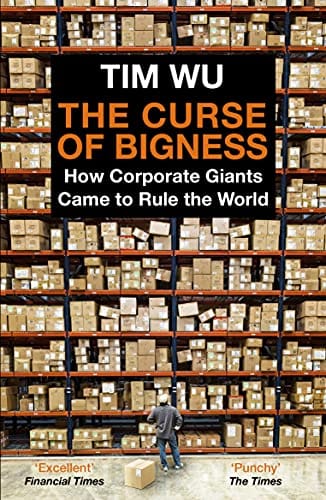Tim Wu’s new book, The Curse of Bigness: Antitrust in the New Gilded Age, has stirred up heated debates on corporate’s bigness in today’s digital economy. Here are two different point of views based on his recent op-ed on the New York Times in this subject.
Nicole H
Let’s not just call them monopolies, let’s call them global conglomerates.
Here are a few ideas for how all the Davids can break up conglomerate monopoly power Goliaths:
1)Break them up into the smallest, SINGLE purpose companies (i.e. a Tv company should not be in the business of producing pharmaceuticals or have subsidiaries making F-15 fighter planes, etc)
2) There is no “democracy” without economic democracy. Transform each corporate charter into COOPERATIVE structure: the business would essentially be ONLY run BY & FOR the people actually working in it. They would reap the profits of their labor–not the financial, non-working, aristocrats siphoning the profits into their Wall street casino portfolios. Google: Mondragon–the most successful example of this business structure (founded in the 1950’s!). Yes, it is possible to have a good quality of life as a worker when the system is balanced and just.
This would also restore true competition to an economic system, reestablishing a true “free market”—not the bogus globalist one that we’ve been indoctrinated with for the last 40 years.
3) Encourage the creation of small businesses within a local ecosystem. This would also restore a sense of community and sow the seeds for a healthy quality of life. It would also restore governing power at the local level
Chris
In his Op-ed, Professor Wu attempts to resurrect the intellectually bankrupt and long-ago rejected Columbia School of antitrust analysis by conflating it with fascism. He then proceeds to mischaracterize both the past and current states of concentration in product markets.
Size and scale are not grounds for antitrust enforcement, the abuse of that power by using unlawful conduct to monopolize a market are, the key being “unlawful conduct” as opposed to legitimate competition. Furthermore, only where such conduct reduces the performance of the market by raising prices is such conduct typically actionable. The laws proscribing monopolization are still in force and available to litigants, including the FTC and DOJ.
Perhaps in NYC one can patronize small businesses to access the wide assortment of goods found on Amazon. Perhaps one can go to the library of a large university to find the information available on Google. But, only if one lives in the insular world of a large university in a major city.
As one who has practiced for many years in the field of antitrust, I find that the professor’s arguments academic rubbish. The Columbia School was rejected for very good reasons many years ago. It should remain entombed.

